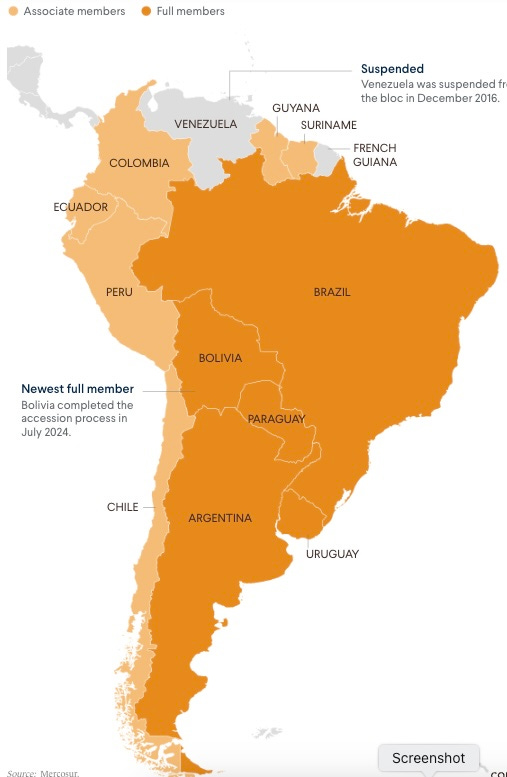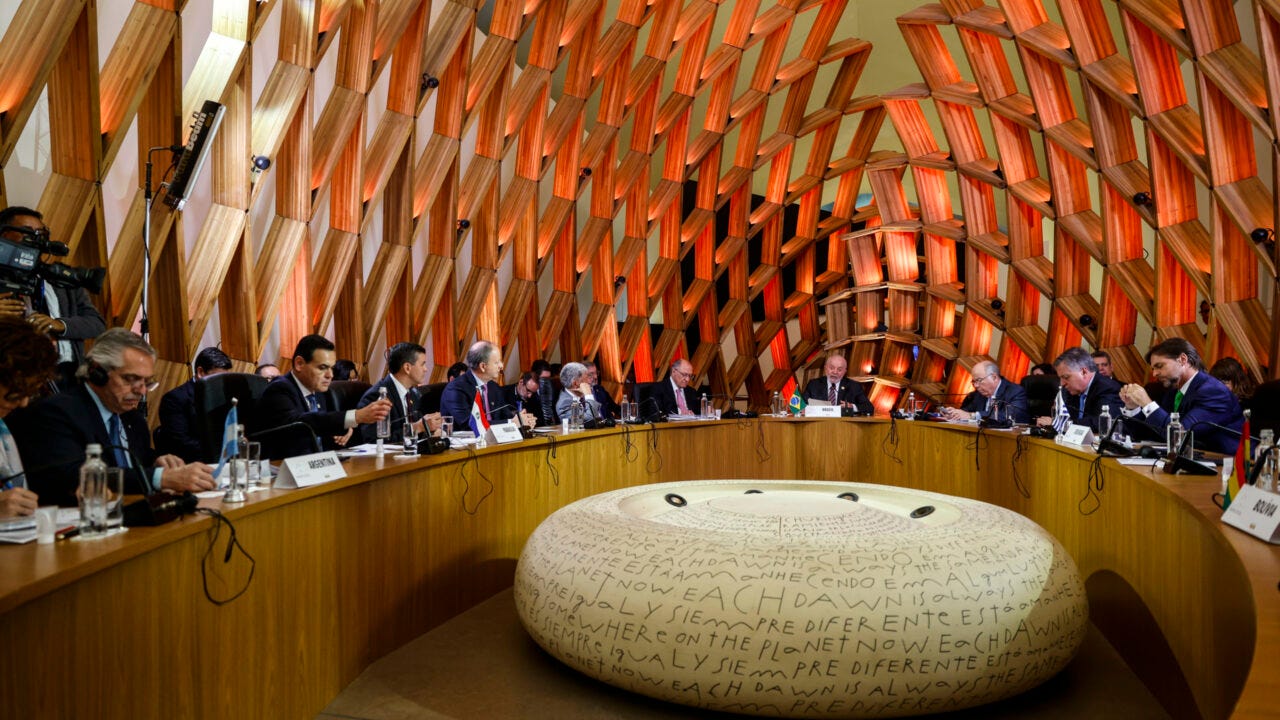What is Mercosur?
Mercosur is a regional trade bloc in South America founded by Argentina, Brazil, Paraguay, and Uruguay on March 26, 1991. The agreement promotes free trade and the movement of goods, people, and currency among member states. Since its founding, Mercosur has added many South American countries as associate members, suspended Venezuela as a member in 2016, and added Bolivia as a full member.
Foundation and Objectives
Mercosur was founded with the primary objectives of creating a common market that would help the economic development of the member countries, improve their competitiveness in the global market, and contribute to regional integration. The bloc sought to enhance economic cooperation and social stability by eliminating trade barriers and harmonizing policies.
The group was also a way to build better relations between the two main South American nations of Brazil and Argentina. They had been rivals since their colonial periods at the expense of the entire region. In fact, they had competing nuclear programs until they abandoned them in 1991.
Impacts on Founding Participants
Since its inception, Mercosur has positively impacted the economies of its founding members, Argentina, Brazil, Paraguay, and Uruguay. The Intra-Mercosur trade grew from US$4 billion in 1991 to US$9 billion in 2002 to $41 billion in 2024.
It has reinforced intra-Mercosur trading. However, only 16% of all Mercosur international trade is conducted within the Mercosur group of nations. China, the EU, and the United States are the top trading partners of Mercosur nations. The amount of trade within Mercosur has increased quite a bit, but it still ranks only 4th among their trading partners.
Economic Growth and Trade Expansion
The trade agreement led to increased intra-regional trade, which has benefited all member states. Mercosur facilitated access to larger regional markets by reducing tariffs and other trade barriers. This, in turn, encouraged investment and industrial growth, particularly in sectors like agriculture, manufacturing, and services.
Democracy
When Mercosur was founded, all four countries had just emerged from military dictatorships and embraced Democracy. Mercosur has a democratic component to its administration and desires to be part of this simply by aligning trade outlooks. The facet of Mercosur that supports Democracy is rarely spoken about outside the group. However, this facet drove the association to suspend access to Venezuela and threaten Paraguay’s membership.
Social and Political Impacts
Mercosur has also contributed to political stability and social development in the region. The integration and cooperation among member states have helped address common regional challenges such as poverty, inequality, and political instability. Furthermore, the bloc's collective negotiation power has allowed the member countries to better defend their interests in international forums.
The political fortunes of Argentina and Brazil, the two major economic powers, often determine the importance of Mercosur. When either of these nations is focused on internal politics, Mercosur's open access and political importance are ignored.
Current State of Trade
Mercosur continues to play a crucial role in South America's economic landscape. While the bloc has faced challenges, including political differences and economic crises, it has maintained its commitment to regional integration.
Intra-regional trade remains strong, with member countries exchanging diverse goods and services, from agricultural products to automobiles and textiles. Efforts to further integrate the economies, such as advancing common standards, continue to strengthen trade relations among members. But that political advancement is very stop and go.
Free Trade Agreements with Non-Mercosur Countries
Mercosur has also pursued trade agreements with countries outside the bloc to enhance its global trade presence. Notable agreements include those with the European Union, various South American nations, and the Southern African Customs Union. These agreements aim to reduce trade barriers, promote investment, and create new opportunities for economic growth. Mercosur has also promoted trade with other nations in South America. Working with a single entity like Mercosur enables easier trade access for all other South American nations.
The most critical pending negotiations are with the European Free Trade Association.
Future Prospects and Impact on North American Trade
As Mercosur looks to the future, several key areas will shape its trajectory.
Expanding Trade Partnerships
Mercosur is actively seeking to expand its trade partnerships beyond South America. Negotiations with countries and regions such as Canada, Singapore, and the EFTA (European Free Trade Association) indicate the bloc's ambition to widen its economic influence and create new opportunities for its members.
Impact on North American Trade
The evolution of Mercosur and its expanded trade agreements may have significant implications for North American trade. As Mercosur strengthens its ties with other global economies, North American countries, particularly the United States, may face new competition in sectors where Mercosur countries have competitive advantages. Additionally, the deepening of economic integration within Mercosur could lead to more cohesive and strategic trade policies, further enhancing the bloc's position in the global market. Mexico has looked to South America and Mercosur for trade agreements that might be is less politically and economically volatile than USMCA – NAFTA.
Challenges and Opportunities
While there are numerous opportunities, Mercosur's future is not without challenges. Political instability, economic disparities among member states, and external pressures are potential obstacles. However, a continued commitment to cooperation, innovation, and adaptation can help Mercosur navigate through these challenges and prosper.
Mercosur remains a vital and dynamic trade bloc with a rich history and promising future. Its impacts on founding participants and evolving role in global trade underscore its importance in the economic development of South America and beyond. However, it will be hard for Mercosur to repeat its early successes if the political systems swing between free trade and managed trade ideologies.





